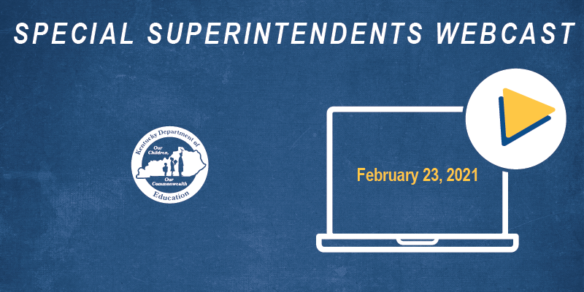
- Andy Beshear issues executive order calling for a return to in-person classes by March 1.
- The U.S. Department of Education has not issued a waiver on statewide assessment testing this school year.
By Jim Gaines
jim.gaines@education.ky.gov
Superintendents from five Kentucky public school districts shared how they plan to use their portion of $928 million in new federal Elementary and Secondary School Emergency Relief (ESSER II) funding during a virtual webcast on Feb. 23.
Commissioner of Education Jason E. Glass had asked for the presentations during the Special Superintendents’ Webcast to give other school districts ideas on how the money could be used.
The Kentucky Department of Education (KDE) issued guidance on Feb. 8 about using ESSER II funding. The new money, a second round of federal funding meant to help schools and districts during the COVID-19 state of emergency, can be used for expenses going back to March 13, 2020, and can pay for expenses obligated up to Sept. 30, 2023.
The purpose of the new funding is to help prevent COVID-19 outbreaks and prepare for responding to them, but with added emphasis on counteracting learning loss, making health-related improvements to schools and improving school air quality. Spending must be tracked separately from ESSER I funds.
Warren County
Warren County Public Schools Chief Academic Officer Melissa Stephanski said the district has been using a “five-prong approach” to support students and teachers. The new money will continue funding efforts such as student transportation, weekend academic help, winter and spring-break terms, dropout prevention and district accountability meetings, she said.
In January 2021, the district began responding to learning gaps from interrupted education amid the pandemic, discussing how to offer in-person classes four days a week for all students who want them, Stephanski said.
The district has done a lot of research to gain ideas and offer schools a choice on how they want to operate during COVID-19, she said.
Superintendent Rob Clayton said Warren County schools are focusing on retaining skilled personnel to best help students.
Pikeville
As a small district, Pikeville Independent Schools is encouraging community participation in its plans and ensuring all stakeholders are involved, Superintendent David Trimble said.
With the new funding, the district aims to focus on intervention, enrichment, mental health and technology, he said. All students need help making up for lost time, not just ones who were struggling before COVID-19, Trimble said.
Pikeville schools are working with community partners to provide intensive, creative summer academies, he said. Some of those may be for parents to help them manage distance learning, Trimble said.
Fayette County
Fayette County Public Schools plan to offer a Summer Ignite program to help students make up for what they missed in the past year and prepare for a return to class in the fall, Interim Superintendent Marlene Helm said.
It won’t be an ordinary summer school, though. Mendy Mills, the district’s associate director of Title I, said Fayette County has never held a summer program of this size, and families and the community are being asked to get involved.
The intention is for every Fayette County school to participate in all three of the planned summer sessions, Mills said.
“We are planning something similar for the following summer as well,” she said.
For additional student support, the district envisions putting “partner hubs” on the street – retrofitted vehicles to bring students needed materials and access – instead of requiring them to go to a school building, Helm said.
Rockcastle County
Rockcastle County Schools hope to return to in-person classes four days a week, perhaps by mid-March, Superintendent Carrie Ballinger said. School officials know some students will remain virtual, and the district will target them for online support and tutoring, she said.
The district will offer CampROCK summer school, which will be held two days a week for elementary students and as week-long learning labs for high school students, Ballinger said.
Wireless internet hot spots have been vital for instruction in rural areas that lack good wired internet service, and the school district will continue providing those in the fall, Ballinger said. A school-provided technology help desk has been a great resource for families, and more improvements to digital learning are coming, she said.
The district is partnering with other agencies to offer students social and emotional help, Ballinger said.
Fort Thomas
Last spring, Fort Thomas Independent Schools set a goal of offering all students the opportunity to attend in-person classes every day if they wanted, Superintendent Karen Cheser said. Teachers who had medical conditions that put them at high risk from COVID-19 could opt to teach students who were learning virtually.
Bill Bradford, the district’s assistant superintendent for teaching and learning, said Fort Thomas is making many changes to remote learning access, trying to personalize learning while supporting students and monitoring their progress.
Jamee Flaherty, assistant superintendent for student services, outlined the district’s emphasis on mental health, social and emotional support and plans for the coming school year. Those are based on a resiliency poll the district has given for several years to grades 3-12. Results from the November 2020 poll were similar to previous years overall, but showed an increase in isolation among some students, Flaherty said.
That finding led to greater emphasis on student engagement, additional community resources and extracurricular activities, and continuance of summer enrichment courses to keep a focus on learning and collaboration, she said.
The district, working with a local nonprofit, plans to promote mental health and wellness among teachers and staff, Flaherty said. Mental health priorities will be added to professional learning plans.
Return to In-Person Classes
Immediately following the superintendents’ webcast, Gov. Andy Beshear announced an executive order recommending that all public school districts offer or expand in-person instructional opportunities beginning March 1, or seven days after district personnel receive their second COVID-19 vaccination. All schools still must provide virtual classes for students who want them for the rest of the current school year.
Face masks still will be required for in-person attendance, and schools will need to evaluate ventilation and safety procedures as outlined in the Healthy at School guidance document.
As of March 1, all requirements applicable to schools in the state’s color-coded COVID-19 Mode of Instruction matrix will be discontinued. Schools should continue to review the county-level COVID-19 incidence map to make informed decisions, including postponing, canceling or scaling down activities if community transmission levels become high.
Statewide Assessment Testing
Glass said he is disappointed in a Feb. 22 announcement by the U.S. Department of Education (USED) that requires Kentucky to administer statewide assessments for the 2020-2021 school year.
Many states, including Kentucky, had asked for a waiver of the testing requirement due to the ongoing COVID-19 pandemic.
Glass said he wishes states would be allowed more flexibility on whether to hold testing, but that the decision appears to offer a window for waiving accountability provisions. There also are some options for flexibility on how the testing is offered, and KDE is researching those, he said.
KDE has released two guidance documents in anticipation of offering statewide tests this spring. The “COVID-19 Participation in Spring 2021 Kentucky State Testing,” includes flexible test windows, a reduction in the time for assessment administration, where possible, and an option to bring in small groups of full-time virtual students for in-person assessment. The “Kentucky Summative Assessment Administration Guidance 2020-2021 School Year,” provides specific guidelines for test administration, test accommodations, safety expectations and staff training.
Use of Retired Teachers
Many districts have sought advice on using retired or soon-to-be-retired teachers to help cover for absent colleagues during the pandemic. Beau Barnes, deputy executive director and general counsel for the Kentucky Teachers’ Retirement System (KTRS), addressed those questions.
“Retired and retiring teachers certainly can be used in the classroom, but there are limitations,” he said.
Federal tax law prohibits any prearrangement between a retiring employee and their employer for that person to return to work, Barnes said. To avoid trouble with the IRS, retired teachers must take a 12-month break before returning to teach full time in their previous district, or a three-month break before returning part time to that district or full-time in a different district, he said.
None of the federal restrictions have been eased due to COVID-19, Barnes said. There may, however, be advantages for teachers and districts in using staff during the summer months.
Barnes urged people to contact him at KTRS with questions or for further details.
COVID-19 Guidance Compilation
On Feb. 22, KDE released a searchable 136-page manual containing the latest versions of all of its guidance documents for schools and districts on operations during COVID-19.
The “KDE COVID-19 Guidance 2.0” includes all guidance released from May 2020 to the end of January 2021, said Kelly Foster, KDE associate commissioner in the Office of Continuous Improvement and Support. There are not any substantial changes to the guidance in this document.
“We just put everything in one place where you could search for it, rather than having to go through the individual documents on the web,” she said.
The Guidance 2.0 document can be found in the reopening section of KDE’s COVID-19 webpage. There also are individual links to any guidance released since Feb. 1, Foster said.
Broadband Speed Testing
Lt. Gov. Jacqueline Coleman urged superintendents to promote the Kentucky Broadband Initiative Speed Test in their communities.
“It literally takes 30 seconds; it’s completely anonymous,” she said.
Providing better broadband service has been a high priority for the Beshear administration from the start, but the state won’t know where to focus its efforts without knowing the existing weak points for service, Coleman said.
The results will be used to build a map of service levels. If people don’t have internet service at home, they can log on at a friend’s house or local business, enter their home address, and specify that they don’t have home internet service, Coleman said.




Leave A Comment